- Home
- David Bernstein
Surrogate Page 2
Surrogate Read online
Page 2
“Yes,” the doctor said, calmly. “I do.”
The conversation mercifully at an end, Tom turned to walk away, but stumbled. His legs gave out and he fell to the floor unconscious.
4
Tom was sitting by Rebecca’s bedside when she woke up. She was weak, but recognized him immediately, opening one eye, then the other. She cracked the smallest of smiles and moved a couple of fingers, as much of a wave and a hello as she could muster. After that, she went back to sleep.
He stayed with her, wanting to always be at her side, day after day, forgoing work and all else, including showering as much as he should have. Little by little, she grew stronger. By day six she was up and walking. It was painful and trying, but he assisted her with every step.
Rebecca had been told everything except for the fact that she would no longer be able to have biological children. Tom struggled daily with the decision of when to inform her; afraid that telling her would hinder her recovery. Adoption was on the table as far as he was concerned, and he assumed Rebecca would go for the idea too, as long as his past didn’t sour the notion. But that mode of thinking was for another day.
“There’s something you need to know, sweetie,” he began after she finished her hospital breakfast.
“What is it?” she asked, her bright and jovial appearance becoming instantly guarded. She placed a hand on his arm, urging him on.
Tom stared at her, fighting back tears and trying to remain strong. He couldn’t get it out; the words refused to leave his throat. The light in Rebecca’s eyes seemed to fade. He hated seeing her that way and looked at the floor, wishing with all his heart he could change what he had to tell her.
Forcing a smile, she said, “Tom, it’s okay. Just tell me.”
He glanced at her, meeting her gaze.
She pulled her hand away, covering her chest. “You’re scaring the shit out of me, sweetie.”
“They found cancer in you,” he said.
“I know,” she told him, somewhat relieved. “That’s why I’m going for chemo.”
The room was silent, except for the beeping of various machines.
“It was in your left ovary,” he explained, making sure to maintain eye contact.
She looked stricken.
“What?” she asked.
“You had stage one ovarian cancer. The ovary had to be removed.”
“Okay,” she said, attempting a weak smile. “But I have another one, right?”
Tom shook his head. He didn’t know how to break it to her. There was no gentle or proper way, so he just said it. “The bullet that hit you tore through your insides, destroying some large intestine along with your right ovary. They couldn’t save it.”
Rebecca yanked her hand back. Glancing down at herself, she began feeling her stomach.
“You mean…” Rebecca paused, the words left hanging in the air.
Tom reached out to comfort her, but she recoiled like an abused canine.
“I’m sorry, sweetie,” he told her, wanting to embrace her, but knowing he needed to leave her be for a moment.
When Rebecca finally looked up at him, Tom told her everything, most of which she had heard already, save the part about both ovaries being removed.
Rebecca didn’t say a word, as if her mind was elsewhere, but he could tell she was listening. When he was done talking, she said nothing, did nothing. She didn’t cry or scream or pound the bed. Instead, she simply rolled onto her side and curled into a ball.
5
Two days after receiving the news about her ovaries, Rebecca was released from the hospital. She still had stabbing pains in her abdomen when she moved, and physical therapy could be agonizing at times. Sitting on the couch and watching television proved far less excruciating.
Tom stayed home from work for a few days, waiting on his wife hand and foot. It seemed the shooting had done less damage than the cancer, which Tom guessed made sense.
Rebecca’s emotional state worsened with each chemo session, sending her into a deeper state of depression. She’d been nothing more than a shadow of her former self, ever since Tom gave her the devastating news. She remained in bed for days at a time. He’d hated himself for having to tell her, but ultimately it was better coming from him than some stranger.
She hardly ate. Her body became frailer by the day. Tom would have to literally drag her to her feet so she could get some exercise done before carrying her back to bed. Occasionally she would show signs of coming out of her dark state, but it seemed the chemo treatments took almost every ounce of whatever made Rebecca her former self.
She understood the need to be grateful she was alive, which she was thankful for, but it was just so damn difficult for her to care about anything. A great darkness had befallen her, turning the world into a morbid, dreary hell.
Tom was doing all that he could and came to the realization that his wife needed to see a professional, something her doctors had recommended, which she had initially refused.
A month after being home, she agreed to see someone.
6
Dressed in a navy blue T-shirt and gray sweatpants, Rebecca found herself sitting in the office of Dr. Jerome Tuber. She hadn’t wanted to see a shrink, but she loved her husband and did it for him. There was a bit of logic at play as well—she realized she couldn’t stay in bed for the rest of her life.
Dr. Tuber wore gold-rimmed glasses on the edge of his rather large nose, had a full head of graying hair, and was dressed as if he were ready to head out to a party on a yacht.
The man’s office was spacious. Bookshelves, packed with leather-bound books and scientific journals, stood tall against one of the walls. A dark, mahogany desk, with intricately carved designs along its edges, sat in front of a large rectangular window, overlooking the woods behind the building. Framed degrees and various awards, along with the occasional piece of abstract art, lined the walls in various places.
“So, Rebecca,” Dr. Tuber began, “why are you here today?”
She forced a smile. “Because I’m dying inside,” she said.
“I see you had cancer,” the doctor said, looking over Rebecca’s intake form. “Is that what you’re referring to?”
“No,” Rebecca said, angrily. “Fuck the cancer. And if there’s any left, I hope it gets what’s coming to it: a quick, miserable death.”
The doctor didn’t flinch, or show the slightest sign that he was affected one way or the other by her outburst.
“So then spiritually?” he asked.
“Yes…sure,” she answered, shoulders slumping.
“How do you feel?” the man asked.
“Like a part of my soul was ripped out when they took my parts.” The words were soft, Rebecca finding it easy to open up. She had nothing left to lose, and wanted to get through this, if anything, for her wonderful husband.
“Ah, the oophorectomy.”
“The what?”
“I’m sorry. Oophorectomy is the proper term used when only the ovaries are removed. When it’s the whole uterus, it’s called a hysterectomy, but most people would refer to your state as having had a partial hysterectomy.”
Rebecca’s eyes looked up from the floor, catching the doctor’s stare. A few strands of her hair fell in front of her face.
“Yes,” she said harshly. “The partial hysterectomy.” Emotionally, she was up and down, defeated, then ready to fight.
Dr. Tuber sat snug in his chair in a nonjudgmental position. He only tilted his head slightly, as if trying to discern something mentally.
Rebecca had made a mistake. The carved-out-of-a-mold shrink was full of shit. The guy couldn’t help her. No one could, except maybe someone who had experienced what she had gone through.
“When were you told about the cancer?” the doctor asked.
“A few days after my surgery. The surgeons discovered it while I was cut open on the operating table.”
“So you weren’t aware of all the procedures they performed on you, before
or directly after surgery?”
“No.”
“How were you feeling before the news of the partial hysterectomy?”
Rebecca frowned, wanting to shove her answer of “shitty” down the man’s throat, but held back as she thought about the question.
She had felt good, mentally at least. Physically, she was in pain, sore and tired, but emotionally she was fine. No, she was better than fine; she was grateful to be alive.
And she would have remained so if Tom hadn’t told her about the hysterectomy. She would’ve kept trying to have children, unaware she wasn’t able to anymore. It would have sucked, but she would’ve gotten over it, hoping she could adopt. But with her current situation, she was robbed immediately, suddenly. But wasn’t that how life was? Knowing should’ve changed her view, made it easier. Now instead of trying, failing, waiting, and taking drugs, she could get past all that and move on to the next alternative: adoption.
“Rebecca?” the doctor said. “Tell me what you’re thinking.”
“I felt lucky to be alive,” she told him, as if realizing that fact for the first time. “But then things changed and my future, the future I’d imagined since I was a kid, was stolen from me.”
Rebecca sat with her feet up on the chair now, knees tucked close to her chest, tears sliding down her cheeks.
Dr. Tuber shifted in his chair and placed the end of his ballpoint pen in his mouth, studying her.
“Have you thought about adopting?” he asked.
Not at first, of course. She wanted her own children. Over time, even through her depression, she began thinking about the idea, almost welcoming it, until she remembered Tom’s past.
“Yes,” she answered.
“And?”
“And I thought about it.”
“You know, Rebecca,” Dr. Tuber began, “there are hundreds of thousands of kids out there that could use a loving home.”
“Don’t you think I know that?” she answered, angrily, slamming her hand on the arm of the chair.
Again, Dr. Tuber did not react to her emotional outburst.
“So, Rebecca…what is the problem?”
“My husband’s arrest record. That’s the goddamn problem, Doc.”
The doctor sighed heavily, but otherwise remained still.
“And you feel his past will hinder your and his ability to adopt?”
“Arrest records for cocaine possession and two DUIs follow a person around for the rest of his life. They may have happened when he was young, in the past, way before I met him, but they’re always looming, waiting to jump out and ruin something.”
“I see,” Dr. Tuber said. “But nothing is impossible if you want it badly enough.”
Rebecca sat up, a bulging vein running down her forehead, revealing itself like a worm trapped under her skin.
“You don’t think I know that?” She didn’t wait for an answer. “If Tom hadn’t started his own business and worked hard at it, who knows where we’d be now. No one likes to give a second, let alone third, chance to someone like Tom, and when they do, it’s usually in the back of some dump-of-a-kitchen washing dishes.”
“How’s your husband’s narcotic activity now?”
Rebecca’s face contorted into a look of utter contempt. “That was a different Tom. That Tom was in college and liked to party with the frat boys. He hasn’t touched drugs since and only has the occasional drink with dinner.”
“I still think, when you’re ready of course, you should look into adoption.”
Rebecca slumped back into her chair as if the doctor had sucked all of her spirit away.
“What’s the point?” she said, slowly shaking her head. “It’ll just be one more thing that will…” She trailed off.
“Disappoint you?” the doctor said, finishing for her.
She nodded as tears began to fill her eyes.
7
Tom and Rebecca took the doctor’s suggestion and applied for adoption. During that time, Rebecca continued with her therapy, improving from where she’d been when first coming to see Dr. Tuber. But with each adoption agency coming back to them with a no, her depression reared up again. Each denial or “come back at a later date” sent Rebecca’s mind deeper and deeper into despair.
During one of her therapy sessions, Dr. Tuber, speaking in an almost whispered voice, asked, “What if I told you, Rebecca, there was a way to not only have a child, but a biologically matched child. A progeny produced by you and your husband.”
Rebecca’s eyelids fluttered. She looked up at the man as if seeing him for the first time. What the hell was he talking about? Her insides had been taken from her, ripped out like the cancer.
She had originally come to him because of a recommendation from one of the doctors at the hospital who said Dr. Tuber could perform “miracles.” That the miracle man had done wonders for couples just like her and Tom.
Rebecca shook her head. What was she thinking? The truth was that she’d really only come to Dr. Tuber because she loved her husband and was willing to try anything to get past what had happened. But now she saw this wasn’t going to work, and the deductible she was paying for each visit wasn’t worth the farce.
She put her hands on the arms of the chair and pushed herself up. Standing, leering apologetically down at the doctor, she said, “I’m sorry. You’ve been a big help, but this isn’t working.” She moved to leave.
“Rebecca,” the doctor called. “You haven’t answered my question.”
She stopped, closed her eyes and took a deep breath, exhaling the air from her lungs and relieving a portion of pent-up pressure.
“What if’s aren’t for people who live in reality, Doctor.” Then she turned to him. “Isn’t that what I’m supposed to be doing? Dealing with the ‘real world’?”
“Yes, of course,” he said. “Now please, answer the question: What if I could make it possible for you and Tom to have a biological child?”
“I’d say you are a fucking miracle worker.”
“Well,” the man said, smiling, “I’d like to think of it more as the evolution of science.”
8
Tom came home from work to find his wife in the kitchen, cooking a roast with potatoes and green beans. He couldn’t remember the last time she had done so, and he welcomed the aroma. He knew she’d been to the doctor earlier that day and wondered if the man had given Rebecca a new “happy pill.”
“Hi, honey,” she said, greeting him with a peck on the cheek before returning to the stove.
“What’s all this?” he asked.
“Dinner, silly,” Rebecca said, looking all motherly in her flower-patterned apron.
Motherly—Tom cringed just thinking the word. He was almost afraid she’d hear his thoughts and go from joyous to a crumbling, sobbing wreck.
“Go upstairs and get undressed,” she told him. Tom smiled, raising an eyebrow, and strolled over to his wife. “No,” Rebecca said. “I mean get out of those work clothes and into something comfortable. Dinner will be ready in a few minutes.”
He tried to speak, to protest, wanting to skip dinner and go straight for the after-dinner snack, but she held a finger to his lips.
Rebecca’s lips were a brighter shade of red than they normally were, and her cheeks had a soft, rosy appearance. Her eyes stood out, sharp and defined, striking. Tom realized she was wearing makeup; something she hadn’t done since her accident. Taking in the whole scene now, he had a million questions he wanted to ask his wife, but held his tongue, not wanting to ruin the moment.
He left the kitchen, taking the stairs two at a time. In the bedroom, he threw off his clothes, then jumped in the shower. He dressed in jeans and sweatshirt, and was headed back down in minutes.
Coming down the stairs, the mouthwatering aroma of seasoned beef and sautéed vegetables filled his nose, igniting his taste buds with anticipation. It seemed like years since he’d had a home-cooked meal. Since Rebecca’s incident, he must have put on ten pounds from eating so much
takeout food.
Entering the kitchen was like returning to the past. Rebecca still looked the same; as young and vibrant as she had the day he first laid eyes on her.
The table was set. Burgundy cloth napkins lay folded in a triangular pattern next to each place setting. Silver utensils and fine china plates rested quietly, eager to be used. A wineglass, half-filled with a nice red accompanied each setting. At the center of the table, set in fine Waterford crystal candlestick holders, stood two twelve-inch candles—their wicks burning eloquently.
Tom slapped himself hard, making sure everything before him was real.
“What did you do that for?” Rebecca asked.
“Wanted to make sure I wasn’t dreaming.”
Rebecca giggled. Holding out her arms, she said, “It’s all real.”
“So, tell me,” Tom said, a moment after taking his seat and placing a napkin on his lap. “What’s with the…” He was stumped for the right word. Maybe he should’ve kept his mouth shut, but he couldn’t just pretend. He loved his wife too much for that.
“Return to happiness?” Rebecca asked, finishing his sentence for him.
Tom laughed. “Yes.”
“Dr. Tuber has presented us with a solution to our problem.” She spoke as if holding back excitement; giddy even.
Tom held his smile, grabbed his wineglass and took a gulp. “Really?” He replaced the glass, and picked up his knife and fork.
“It’s unbelievable,” Rebecca blurted. “I thought it was some kind of treatment technique, but he swore he was telling the truth.”
“About…?” Tom asked, cutting into a piece of juicy roast.
“That we can still make a baby.” She looked at Tom with bright eyes and a beaming smile.
Tom froze mid-chew, confused and afraid. Had Rebecca finally lost it? Had he heard correctly? Did she say they could make a baby? Without her ovaries, they couldn’t even use a surrogate.

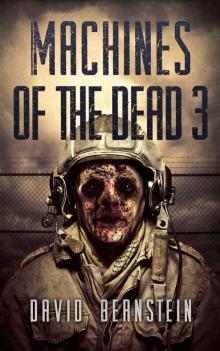 Machines of the Dead (Book 3)
Machines of the Dead (Book 3)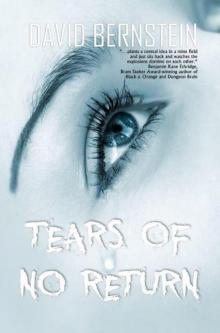 Tears of No Return
Tears of No Return Relic of Death
Relic of Death Machines of the Dead aza-1
Machines of the Dead aza-1 Machines of the Dead
Machines of the Dead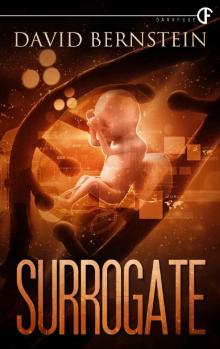 Surrogate
Surrogate Apartment 7C
Apartment 7C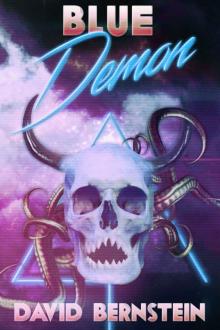 Blue Demon
Blue Demon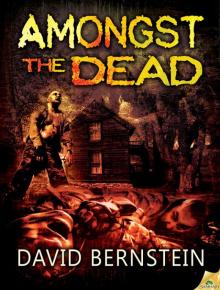 Amongst the Dead
Amongst the Dead Goblins
Goblins Witch Island
Witch Island Another Man's Wife plus 3 Other Tales of Horror
Another Man's Wife plus 3 Other Tales of Horror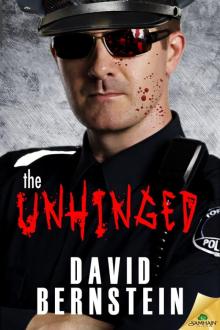 The Unhinged
The Unhinged Episodes of Violence
Episodes of Violence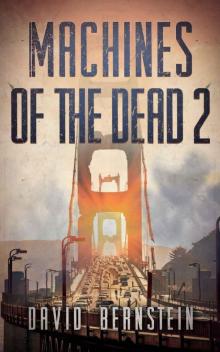 Machines of the Dead (Book 2)
Machines of the Dead (Book 2)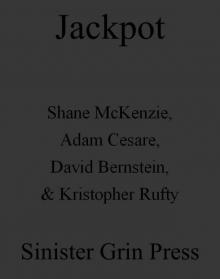 Jackpot
Jackpot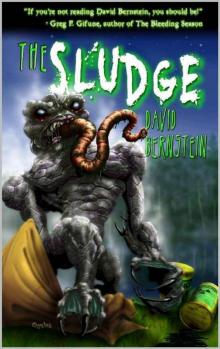 The Sludge
The Sludge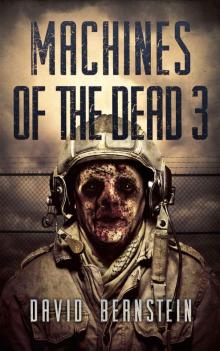 Machines of the Dead 3
Machines of the Dead 3